| DNC Begins Drafting Rules for 2016 Delegate
Selection Process ... > |
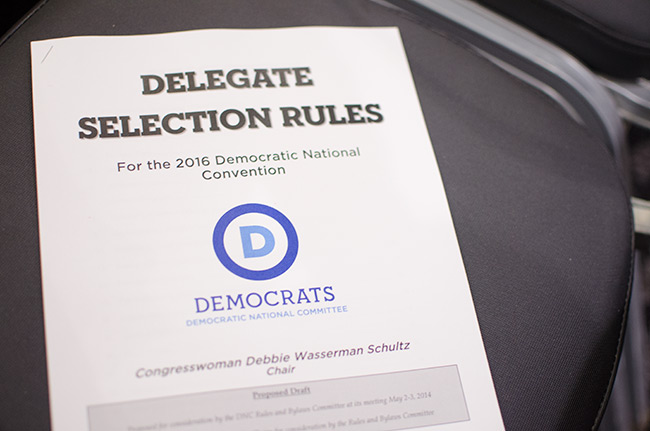 |
| May 2, 2014 - Meeting at the
Liaison Hotel in Washington, DC, the DNC
Rules and Bylaws Committee (RBC) began the process of drafting the
rules that will guide selection of Democrats' 2016 presidential
nominee. Committee
members started with a working draft based very closely on the 2012
rules, but with a few minor tweaks made throughout, mostly for purposes
of
clarity. Although the meeting was scheduled to run for two days,
committee members went through all 21 rules in about three hours,
adopting many of them and tabling some for further consideration at the
next RBC meeting, scheduled for August 1-2, also in Washington, DC. |
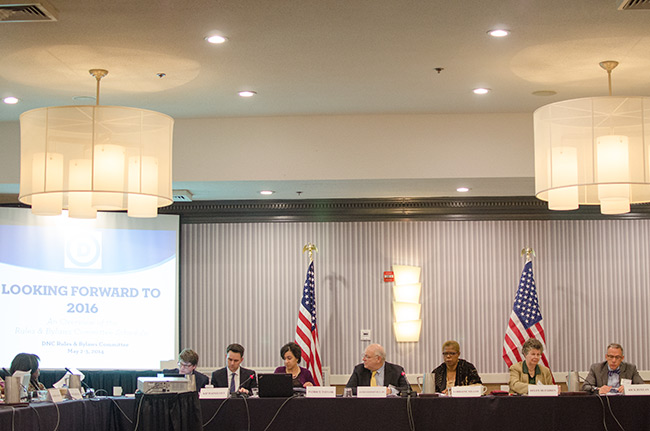 |
| James Roosevelt, Jr. (MA) and
Lorraine Miller (TX) chair the 30-person committee, which includes
members with decades of experience at the top levels of Democratic
politics, people such as Donna Brazile (DC), Harold Ickes (DC), Jeff
Berman (DC), Don Fowler (SC) and Elaine Kamarck (MA). Also on the
committee are the party chairs from the key states of Iowa and
New Hampshire, Ray Buckley (NH) and Scott Brennan (IA), as well as
the presidents of two major unions, Randi Weingarten of AFT and Lee
Saunders of AFSCME. The key DNC staff person is Patrice Taylor,
director of party affairs and delegate selection; DNC counsels Kip
Wainscott and Graham Wilson assisted, and former director of party
affairs and delegate selection Rick Boylan is consulting. |
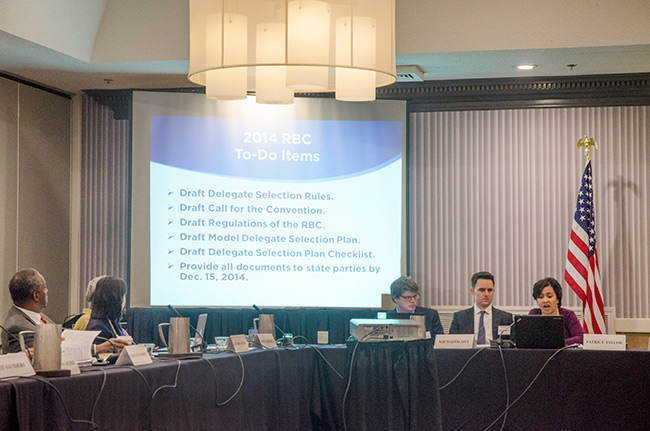 |
| The committee has a lot of work
to accomplish this year. |
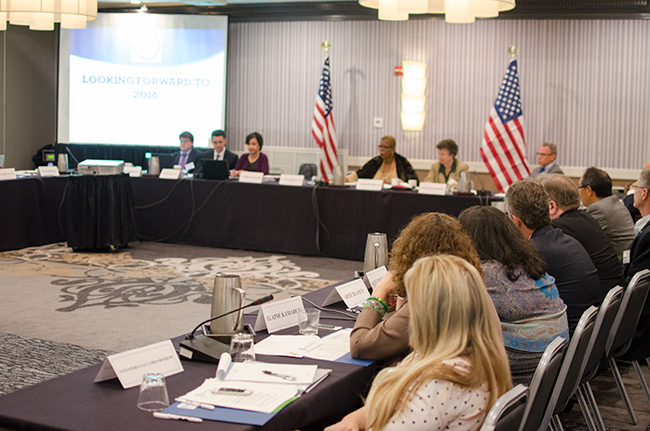 |
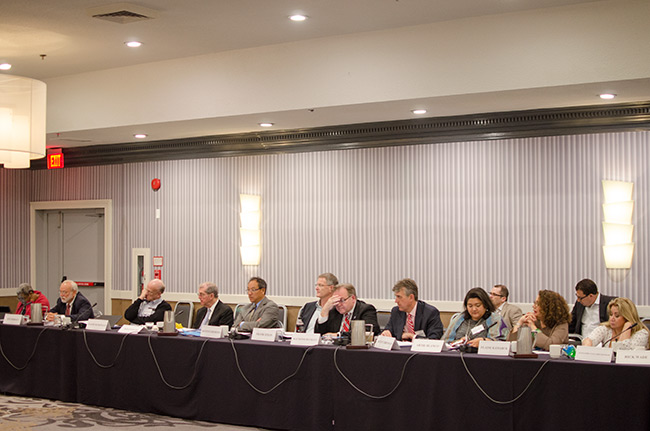 |
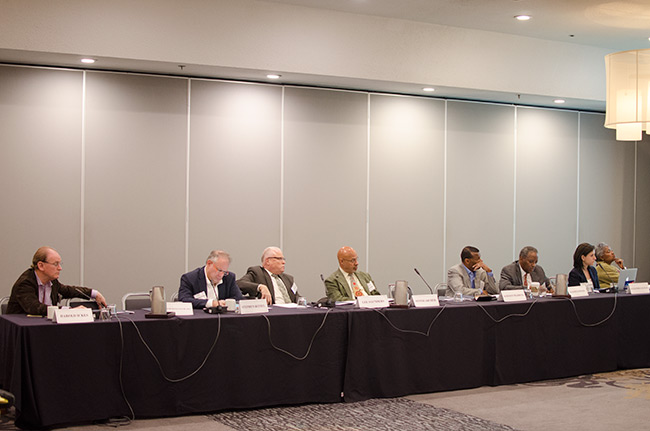 |
| With little discussion the
committee approved Rule 11, which keeps four early contests at the
start of the primary calendar. As it stands now, the schedule
shows the Iowa
precinct caucuses would occur on Feb. 1, 2016, the New Hampshire
primary on Feb. 9, the Nevada first-tier caucuses on Feb. 20, the South
Carolina primary on Feb. 27, and the window for the rest of the
primaries would begin on March 1. In recent cycles the initial
schedule has not held as states jockeyed for early position. For
example, in 2012 Iowa's precinct
caucuses were tentatively scheduled to
take place on Feb. 6, but ended up occurring on Jan. 3. This
cycle,
the Democratic and Republican parties have achieved some synchrony in
their calendars and Republicans are instituting severe penalties for
states that violate their timing rules, so these dates could hold. Iowa Democratic Party Chair Scott Brennan announced that the IDP is examining the feasibility of expanding access to the precinct caucuses so that more Iowans can participate. For example, there are people overseas serving in the military or working, people in nursing homes or hospitals and others. Former IDP executive director Norm Sterzenbach is leading the review. In phase one, ongoing through June, he is holding informal conversations with dozens of people to gauge the appetite for change and consider how it might be accomplished. In phase two, this summer, the party will develop a plan. Phase three will be to put the plan to a vote before the state central committee. One idea that has been mentioned is to have an at-large precinct. Former Detroit Mayor Dennis Archer suggested that technologies (such as Skype) could be used, and AFSCME president Lee Saunders urged that the plight of shift workers be considered as well. Donna Brazile recalled Iowa Republicans' problems with caucus results in 2012 and suggested that Brennan pay attention to how results would be certified if something new is attempted. Elaine Kamarck said changes could quickly get pretty complicated, affecting other rules in unforseen ways; for example she noted that when the caucuses take place in Iowa it is 3 a.m. in Afghanistan. Another member suggested that Brennan coordinate with other caucus states to see if they have input or could benefit from Iowa's review. Brennan said he would keep the Rules and Bylaws Committee apprised of progress of the effort. |
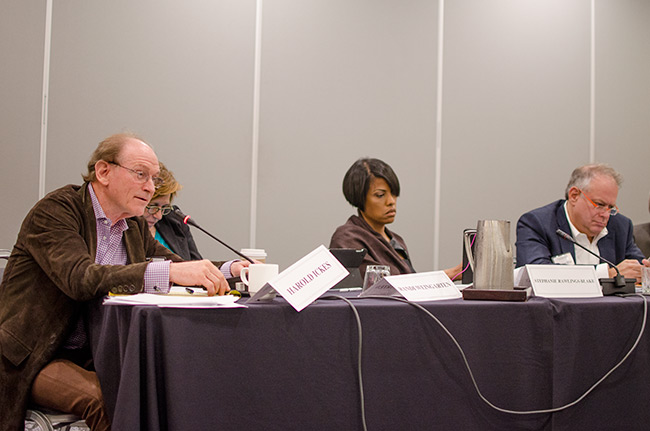 |
| Harold Ickes, a long-time
Clinton advisor and a senior advisor to the independent Ready for
Hillary super PAC, raised several questions during the
proceedings. For example, on Rule 14 - Petition Requirements and
Filing Deadlines, he asked about the rationale for the setting the
number of valid signatures to put a presidential candidate on the
primary ballot at 5,000. (In fact the number is often set by
state law). "Five thousand in New York means
10,000," Ickes said. Don Fowler, sitting across from Ickes, noted
that if the standard were set too low, there could be nuisance
candidates, and in any event Fowler said Ickes never had trouble
getting
signatures. Fowler's friendly barb prompted a story from Ickes, who in 1980 was a key player in Sen. Edward Kennedy's challenge to President Jimmy Carter. Ickes recalled the difficulty of petitioning in Pennsylvania, where, he said, "we damn near didn't get him on the ballot." Ickes said that after the campaign he learned that from a Carter operative that the Carter campaign, in the absence of their notary, had used a silver dollar to simulate the notarization of the petitions. "If we had known that we could have knocked Jimmy Carter off the ballot," Ickes said. Fowler worked on President Carter's 1980 campaign. |
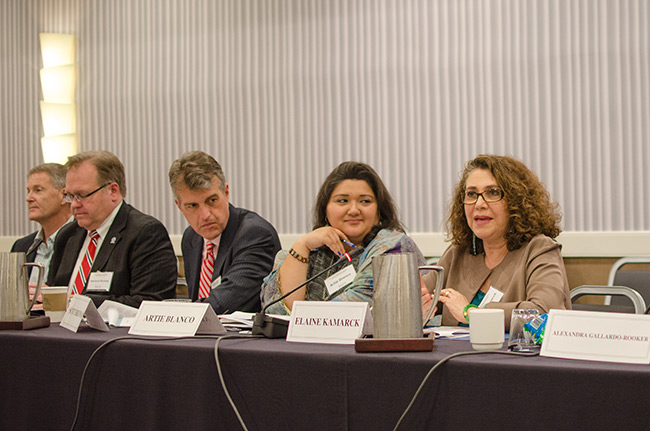 |
| When it comes to the ins and
outs of the delegate selection rules, few are as knowledgeable as
Elaine Kamarck. A lecturer in public policy at Harvard
University's John F. Kennedy School of Government and a senior fellow
at the Brookings Institution, Kamarck is author of Primary Politics: How Presidential
Candidates Have Shaped the Modern Nominating System (Brookings
Institution Press, 2009) and she wrote her Ph.D. dissertation on
"Structure as Strategy: Presidential Nominating Politics Since Reform"
(UC Berkeley, 1986). Conventional wisdom in Spring 2014 sees former Secretary of State Hillary Clinton as the likely Democratic nominee, and indeed if she runs she appears likely to gain formidable establishment support to the extent that some pundits are projecting a "coronation." If there is such a coronation it will have to follow the rules being perfected at this meeting and over the coming months by the Rules and Bylaws Committee. |
| back > |

